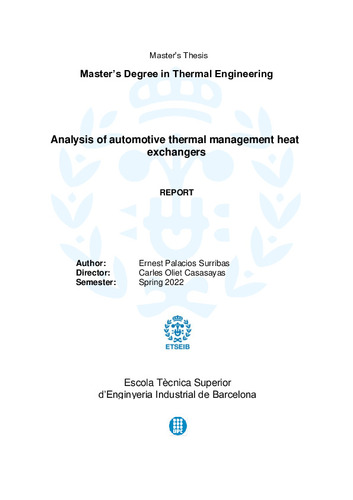Mostra el registre d'ítem simple
Analysis of automotive thermal management heat exchangers
| dc.contributor | Oliet Casasayas, Carles |
| dc.contributor.author | Palacios Surribas, Ernest |
| dc.contributor.other | Universitat Politècnica de Catalunya. Departament de Màquines i Motors Tèrmics |
| dc.date.accessioned | 2022-10-28T14:28:36Z |
| dc.date.available | 2022-10-28T14:28:36Z |
| dc.date.issued | 2022-09-12 |
| dc.identifier.uri | http://hdl.handle.net/2117/375250 |
| dc.description.abstract | This work is focused on a specific application in the field of heat exchangers, and that is a vehicle radiator. Specifically, the project consists of the design and implementation of a code using the MATLAB environment to simulate the thermal behavior of a typical aluminum louvered fin automotive radiator. The methodology used to solve the equations is the ε-NTU and multi ε-NTU method. The working conditions and detailed geometry are defined, and it is explained the algorithm used to solve the problem, and also the specific correlations selected for the calculation of heat transfer and pressure loss, for this kind of heat exchangers. Beyond simulation part, it is also studied the State-of-the-Art of automotive radiators, to have an idea on the recent ideas, methods and ultimate technology applied in this field. In this part it can be seen some very different technologies implemented, which all of them are focused on improving the thermal performance of vehicle radiators. Taking into account the State-of-the-art part, it is implemented one of these novel technologies to the simulation developed in the project. In this case, it is the use of a nanofluid as a coolant in the radiator, with the aim of improving the thermal behavior. Specifically, the nanofluid used in the simulation is water + Al2O3 nanoparticles. The results obtained with the code developed show the heat transfer behavior of the radiator for certain mass flow rates conditions, and they are compared with other experimental results, demonstrating that the code works well enough, despite that the obtained results could be more accurate. The results for the implementation of nanofluid coolant in the simulation also show a clear improvement in the heat transfer rate |
| dc.description.sponsorship | This Project has received funding from the European Union’s Horizon 2020 research and innovation programme under grant agreement No 814975 |
| dc.language.iso | eng |
| dc.publisher | Universitat Politècnica de Catalunya |
| dc.rights.uri | http://creativecommons.org/licenses/by-nc-sa/3.0/es/ |
| dc.subject | Àrees temàtiques de la UPC::Enginyeria mecànica::Disseny i construcció de vehicles::Automòbils |
| dc.subject.lcsh | Automobiles -- Motors -- Cooling systems -- Design and construction |
| dc.subject.lcsh | Automobiles -- Radiators -- Tests -- Computer simulation |
| dc.title | Analysis of automotive thermal management heat exchangers |
| dc.type | Master thesis |
| dc.subject.lemac | Automòbils -- Motors -- Sistemes de refrigeració -- Disseny i construcció |
| dc.subject.lemac | Automòbils -- Radiadors -- Proves -- Simulació per ordinador |
| dc.identifier.slug | ETSEIB-240.171923 |
| dc.rights.access | Open Access |
| dc.date.updated | 2022-10-14T04:23:33Z |
| dc.audience.educationlevel | Màster |
| dc.audience.mediator | Escola Tècnica Superior d'Enginyeria Industrial de Barcelona |
| dc.audience.degree | MÀSTER UNIVERSITARI EN ENGINYERIA TÈRMICA (Pla 2020) |


